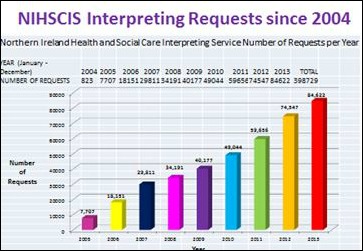Untapped potential: Unlocking the ethnic minority contribution to the NI economy

By Dr Ruth McAreavey, Queen's University, Belfast
Dr McAreavey writes about research conducted on behalf of the Joseph Rowntree Foundation looking at economic and social mobility among ethnic minority groups in Northern Ireland. The study finds that Northern Ireland’s economy is wasting the potential of some of its most skilled and motivated workers. It shows that routes out of poverty are primarily based on participation and progression within the labour market.
Following a period of unprecedented inward migration, our
recent research conducted on behalf of the Joseph Rowntree Foundation examines economic and social mobility among ethnic minority groups in Northern Ireland. The study finds that Northern Ireland’s economy is wasting the potential of some of its most skilled and motivated workers. It shows that routes out of poverty are primarily based on participation and progression within the labour market. Involvement in the labour market is experienced differently for different individuals: the 2011 Census reveals large differences for various ethnic minority groups. Recent arrivals from Eastern Europe have high levels of economic activity and labour market participation, but this is mostly in lower paying sectors of employment. The worst outcomes relating to economic activity, labour market participation, education and health were among the Irish Traveller community. Indian and Filipino communities were mostly represented in higher paying professional sectors.
The study used interviews and focus groups to talk to migrant employees and to organizations with considerable numbers of minority ethnic employees. Positive and negative experiences of the labour market were reported, with both formal and informal processes playing an important role. For instance some employers had developed a ‘buddy’ scheme to help new arrivals settle into their job and into Northern Ireland more widely. Other companies held jobs open on a long-term basis following periods of serious illness. However, poor practice also existed with indications of differential, often unfair, treatment for migrant workers. Also, focus groups highlighted a perception that ‘ethnic markers’ such as skin colour or clothing played a significant role in restricting access to the labour market. This was further hampered by migrants’ unfamiliarity with formal recruitment practices and a lack of networks, both employers and employees stressed the importance of English language skills in supporting promotion and progression within the labour market.
The research discovered a lack of data on the extent to which available government support is used by, or successfully delivering outcomes for, individuals from ethnic minority backgrounds. It recommends that the Northern Ireland Executive shows leadership by demanding that employers treat people fairly and reviewing its own services to make sure that people from all ethnic groups are getting the support they need to improve their circumstances.
The research was conducted by Jenny Irwin, RSM McClure Watters and Dr. Ruth McAreavey, Queen’s University Belfast for the Joseph Rowntree Foundation. The data was collected during March to July 2013.
Segregation versus integration: Personal experiences of migrant workers in NI
 By Jolena Flett, Advice and Advocacy Manager, Belfast Migrant Centre
By Jolena Flett, Advice and Advocacy Manager, Belfast Migrant Centre
Joletta Flett writes: “There are many issues that migrant workers face within the workplace that will vary from the experience of local workers. Migrant workers are often facing complex issues outside of the workplace as well as learning to participate within the workplace”. Here she sets out some of the key components of good practice in developing policy and practice within the workplace, applicable whatever the organisation and whatever the context.
Issues that arise within a diverse workplace can often be difficult to confront and resolve. The most important tools for an employer are solid policies that promote equality of treatment within the workplace.
There are many issues that migrant workers face within the workplace that will vary from the experience of local workers. Migrant workers are often facing complex issues outside of the workplace as well as learning to participate within the workplace. The range of issues is likely to include:
- Difficulties of integration and participation
- Dealing with social issues around identity and community
- Dealing with cultural divides
- Dealing with issues around communication
- Dealing with time constraints
- Newly developed community/support groups
- Priorities when moving to a new country
- Dealing with racism
The following points are some of the key components of good practice. They are applicable whatever the organisation and whatever the context. This is not an exhaustive list but provides the foundation for good practice in the development of policy and practice within the workplace.
1. Define ‘Good Practice’
We all need to identify the values, method, context and processes of our work and to look at their relevance to a diverse workforce and community. The emphasis of ‘good practice’ is on making the delivery of services to the whole community a reality. It is not about treating everybody the same, but about taking account of different need and different realities.
2. Make Policy and Practice Explicit
Policies and practices that are vaguely defined using broad concepts allow for variations in interpretation and this can lead to oppressive practices. To avoid this we need to communicate our policies and practices in a clear and explicit way.
3. Examine the Culture of the Organisation
We need to recognise that all organisations carry formal and informal culture – some of which may no longer be appropriate. We need to identify the culture of the organisation and to enhance the positive aspects of it and to eliminate the negative ones. Given that the culture of an organisation is dynamic rather than static we could work towards making those changes more conscious.
4. Challenge Discrimination
To be anti-oppressive we must challenge discrimination. This requires us to take personal and/or moral responsibility as well as adhering to the organisation’s policies. We are more likely to challenge where we feel we have rights and responsibilities. The organisation’s policies and departmental codes of practice should give us these rights and responsibilities. There may be institutional procedures to support such challenges e.g. grievance procedure, contract compliance.
5. Make the Contribution of Minorities Visible
Revise and review the curriculum, content, method and process of our work with a view to clearly identifying the contribution of minorities. We need to recognise and be critical of the negative images so powerfully delivered to us and we need to make a conscious effort to challenge and replace these images with positive ones.
Challenges faced by the Roma Community in accessing employment and services in NI

By Denis Long, Community Development Coordinator, Roma Community Development Project
With high levels of unemployment, poor literacy, low incomes, living in poor housing and in poor health, the Roma communities continue to be trapped in a vicious circle, moving between discrimination, disadvantage and exclusion. Denis Long looks at some ways of addressing their disadvantages through sustainable employment opportunities.
The Roma people have been identified as the most vulnerable and deprived ethnic group in Europe. Official reports estimate the Roma populations in Europe to be about 12 million people with 6 million people living in the EU.
Many Roma people are of Indian origins, throughout the centuries they have settled in different parts of Europe, the Americas and Australia; therefore they are not a homogenous group. What they do have in common is a `history of oppression` as they`ve continually been subject to sheer persecution: slavery, deportation, sterilisation, anti-Roma laws, ethnic cleansing, assimilation and expulsion. This resulted in the Roma communities living on the margins of society, mistrusting the non-Roma world. With high levels of unemployment, poor literacy, low incomes, living on poor housing and in poor health the Roma communities continue to be trapped in a vicious circle; moving between discrimination, disadvantage and exclusion. The state and the civic societies are failing to protect their rights.
The mass unemployment amongst the Roma populations is simplistically attributed to the low levels of education, poor skills and the status of the labour market. While these are undeniable barriers in accessing employment, discrimination is the most significant barrier and it continues to be ignored.
Migration adds a new dimension in terms of vulnerability: the asylum seeking status and later the EU employment restrictions had a significant impact on the Roma people who were challenged by poor qualifications, poor literacy and English language skills, and poor understanding of the local systems. The access to medical care, welfare and housing support depend on the employment status which increases the marginalisation of Roma people.
The general assumption that access to employment is equal needs challenged and the disadvantages need addressed through sustainable employment opportunities. A few examples include:
-
Addressing the skills and training gap (i.e. work-based training, qualifications, work placements),
-
Putting in place employability mentoring schemes,
-
Encouraging soft skills training,
-
Adult education including language services that are pitched at the right level in accordance to the level of formal schooling and the individual needs,
-
Providing diversity,
-
Cultural awareness for staff.
Strength in Diversity

By Andrea Close, Head of Organisational Development and Coaching, Concentrix
Concentrix has a diverse, multi-lingual workforce and company policy is ‘to attract, delight, retain and promote our people’. Andrea Close talks about the company’s CSR strategy ‘embrace’, which has three strands: People, Place and Planet, and some of the activities the company promotes.
To set the scene we currently employ over 1000 people in Belfast, and service customers in 27 different languages.
One of our key objectives is to welcome people into our business community, which reflects the global clients we work for and parts of the world we serve. To do this, whilst delivering exceptional customer experience, we employ fluent language speakers locally and from all around the world.
Our approach to employee engagement is to attract, delight, retain and promote our people. All of the activities we use to do this fall under the umbrella of our CSR strategy ‘embrace’ which has three strands: People, Place and Planet.
Diversity comes under people and our foundation is built around the three P’s of:
- Easy to read and understand integrated into Business As Usual.
- Code of Conduct for staff and Managers.
- Input from our staff during creation and review of policies
- Employee engagement is in everyone’s KPI’s.
- Attract, Delight, Retain and Promote
- Visible to all, explained and given context.
- Weekly updates about people for people
Our diversity events are very popular. We recently organised a ‘Celebrating Diversity’ event where employees cooked their favourite traditional dishes and shared these in a team lunch. Maps with photos and postcards of where people came from were placed around the Concentrix building, which generated conversations helping to build relationships.
In recognition of the up-coming world cup we are holding a ‘Diversity World Cup’ event with a trophy and awards night. In other companies many approach this football season with dread as it raises the flags and emblems issue, but we have the ability to turn events like this into engagement opportunities, celebrating the diversity of our Concentrix Community.
Making Health and Social Care Accessible
By Orla Barron, Health and Social Inequalities Manager, Belfast Health and Social Care Trust
Orla Bannon writes about the work of the Belfast Health and Social Care Trust in addressing the needs of migrants to Northern Ireland, including the translation service, the nurse-led New Entrants service and a hospital welcome pack in 18 languages. She also looks at the steps taken to improve the difficult area of mental health care.
As our society in Northern Ireland evolves and becomes much more culturally diverse, there are countless benefits to a richer, multi-faceted society. The 2011 Census figures indicated that 1.8% of the resident population belong to minority ethnic groups and that English was not the main language for more than 3% of the resident population – this has significant implications for the provision of public services – none more so than health and social care. It is imperative that HSC services cater effectively for and sensitively meet the needs of minority ethnic service users.
As an employer of over 20,000 staff it is incumbent upon the Trust to ensure staff are appropriately trained and equipped to provide culturally competent services.
-
Northern Ireland HSC Interpreting Service
Belfast HSC Trust manages the Northern Ireland HSC Interpreting Service which provides minority ethnic language support across all health and social care. NIHSCIS has trained and professionally accredited some 430 interpreters in a range of 35 different languages. Since the service began in 2004, demand has significantly increased. Cumulatively the Service has received 440,110 requests in total and has an overall provision rate of 97%.

The top 10 languages include Polish, Lithuanian, Portuguese, Chinese-Mandarin, Tetum, Chinese- Cantonese, Russian, Hungarian, Latvian and Romanian.
-
Northern Ireland New Entrants Service
Another service that the Belfast Trust delivers on behalf of the region is the Northern Ireland New Entrants Service. This is a nurse-led service and provides access to health care for new entrants to Northern Ireland including new immigrants, asylum seekers, refugees & clients who are unable to register for GP services. A range of clinics and drop-in clinics can be accessed to address the health and social well-being needs of the client group, advice and support, health assessment clinics, immunisation clinics and health promotion sessions. Recently resources have increased and the service now offers a GP Clinic and consultant led paediatric clinic.
The aim of the Translated Welcome Pack is to ensure inpatients have access to information and communication about the ward they are in e.g. menu, social services, shop, telephone and TV facilities, spiritual needs etc. It is provided along with training to equip Trust staff and HSC professionals with the knowledge and tools to help facilitate person-centred approach. It has been translated into 18 minority ethnic Languages.
-
Culturally Competent Mental Health Services
Mental Health service provision by its very nature can be complex and so adding a different culture and a different language into the equation will only further intensify the complexity of the interaction between mental health professional and the service user. Research has indicated that mental health services have been under-used amongst ethnic minority communities and so it is imperative that health and social care are proactive in ensuring that their services are accessible and responsive to the needs and culture of the individual. Belfast HSC Trust have worked in partnership with other HSC Trusts and Aware Defeat Depression to develop an online toolkit with information and best practice guidance on providing culturally competent services. This will include how to work well with an interpreter, idioms of distress, differences in terminology and fundamental differences in how various cultures cope or view mental health. In addition to the online toolkit, training and a DVD will be produced to complement the resource.